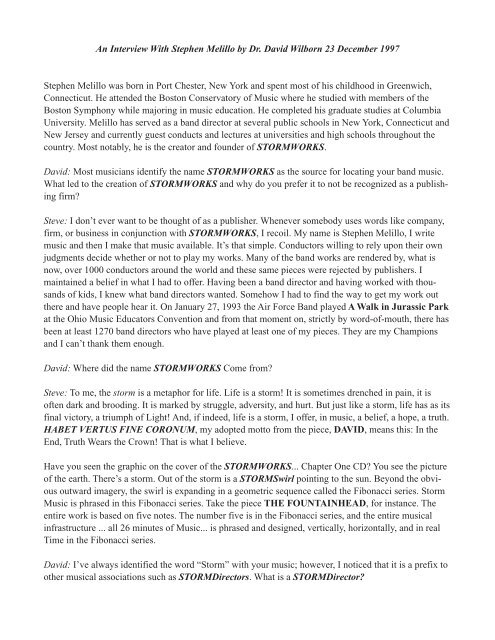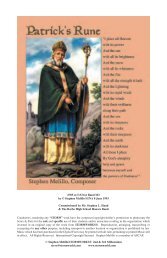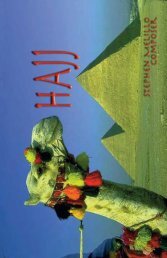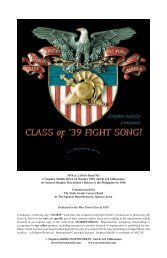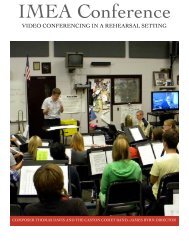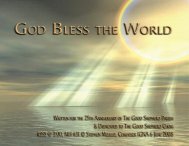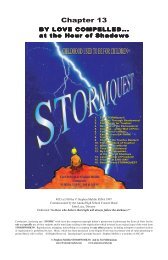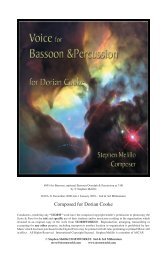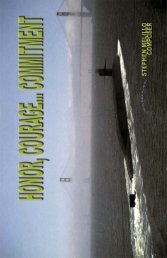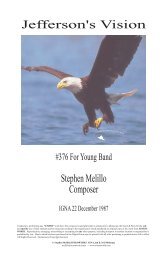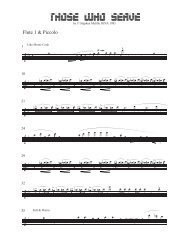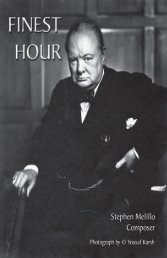Dr. David Wilborn Interview - STORMWORLD
Dr. David Wilborn Interview - STORMWORLD
Dr. David Wilborn Interview - STORMWORLD
You also want an ePaper? Increase the reach of your titles
YUMPU automatically turns print PDFs into web optimized ePapers that Google loves.
An <strong>Interview</strong> With Stephen Melillo by <strong>Dr</strong>. <strong>David</strong> <strong>Wilborn</strong> 23 December 1997<br />
Stephen Melillo was born in Port Chester, New York and spent most of his childhood in Greenwich,<br />
Connecticut. He attended the Boston Conservatory of Music where he studied with members of the<br />
Boston Symphony while majoring in music education. He completed his graduate studies at Columbia<br />
University. Melillo has served as a band director at several public schools in New York, Connecticut and<br />
New Jersey and currently guest conducts and lectures at universities and high schools throughout the<br />
country. Most notably, he is the creator and founder of STORMWORKS.<br />
<strong>David</strong>: Most musicians identify the name STORMWORKS as the source for locating your band music.<br />
What led to the creation of STORMWORKS and why do you prefer it to not be recognized as a publishing<br />
firm?<br />
Steve: I don’t ever want to be thought of as a publisher. Whenever somebody uses words like company,<br />
firm, or business in conjunction with STORMWORKS, I recoil. My name is Stephen Melillo, I write<br />
music and then I make that music available. It’s that simple. Conductors willing to rely upon their own<br />
judgments decide whether or not to play my works. Many of the band works are rendered by, what is<br />
now, over 1000 conductors around the world and these same pieces were rejected by publishers. I<br />
maintained a belief in what I had to offer. Having been a band director and having worked with thousands<br />
of kids, I knew what band directors wanted. Somehow I had to find the way to get my work out<br />
there and have people hear it. On January 27, 1993 the Air Force Band played A Walk in Jurassic Park<br />
at the Ohio Music Educators Convention and from that moment on, strictly by word-of-mouth, there has<br />
been at least 1270 band directors who have played at least one of my pieces. They are my Champions<br />
and I can’t thank them enough.<br />
<strong>David</strong>: Where did the name STORMWORKS Come from?<br />
Steve: To me, the storm is a metaphor for life. Life is a storm! It is sometimes drenched in pain, it is<br />
often dark and brooding. It is marked by struggle, adversity, and hurt. But just like a storm, life has as its<br />
final victory, a triumph of Light! And, if indeed, life is a storm, I offer, in music, a belief, a hope, a truth.<br />
HABET VERTUS FINE CORONUM, my adopted motto from the piece, DAVID, means this: In the<br />
End, Truth Wears the Crown! That is what I believe.<br />
Have you seen the graphic on the cover of the STORMWORKS... Chapter One CD? You see the picture<br />
of the earth. There’s a storm. Out of the storm is a STORMSwirl pointing to the sun. Beyond the obvious<br />
outward imagery, the swirl is expanding in a geometric sequence called the Fibonacci series. Storm<br />
Music is phrased in this Fibonacci series. Take the piece THE FOUNTAINHEAD, for instance. The<br />
entire work is based on five notes. The number five is in the Fibonacci series, and the entire musical<br />
infrastructure ... all 26 minutes of Music... is phrased and designed, vertically, horizontally, and in real<br />
Time in the Fibonacci series.<br />
<strong>David</strong>: I’ve always identified the word “Storm” with your music; however, I noticed that it is a prefix to<br />
other musical associations such as STORMDirectors. What is a STORMDirector?
Steve: A STORMDirector is someone who never looks at himself or herself as an “expert.”<br />
STORMDirectors are perpetual learners and never the “master”! They are on fire with purpose and are<br />
prepared to take the kids as well as themselves on a great journey. STORMDirectors love their kids, and<br />
they love music.<br />
<strong>David</strong>: What does STORMQuest refer to?<br />
Steve: STORMQuest is a suite of 15 interrelated works for “young” band. Though written within the<br />
parameters of the “young” band, these works, all accompanied by teaching strategies, are nevertheless<br />
real expressions of Music... with a capital “M”. This means that all Musical groups will want to play<br />
these pieces because every piece will sound big, powerful, introspective, poignant and exciting.<br />
<strong>David</strong>: You mentioned something about the sound of your pieces. What makes them different and<br />
unique? Kids seem gravitated to them.<br />
Steve: You ask because that is your view?<br />
<strong>David</strong>: Yes.<br />
Steve: The Music I compose is real. What I write, I write because I have honestly lived and felt each<br />
moment. That realness transposes itself into something many people can relate to. In addition to this<br />
obvious Romanticism, there is an intricate infrastructure in the “storm” works. For this reason, the works<br />
are “classical” and will stand.<br />
One day, someone asked me if I made by living by composing music. I smiled. You see, Dave, I make<br />
my “dying” by writing music. The kids sense this! I know when I’ve written Music, because I can feel<br />
myself dying.<br />
<strong>David</strong>: What about your vocabulary of harmonies? Do you find any sort of consistencies as you write?<br />
Steve: Music, capital M music, is void of vocabulary. This is what the contest judges fail to understand.<br />
Play a major chord followed by a cluster at the piano. Now ask the class which one is better? Obviously,<br />
neither of them have any meaning at all. They’re just two sounds. The idea that dissonance has more<br />
value than consonance is silliness. It’s like trying to say that the sound itself carries the message of the<br />
music. (He sings an excerpt of Ode to Joy) Simple, isn’t it? How then, did Beethoven create something<br />
which will last for all Time. Was it a trick? Music has the same relationship to notes, as Architecture has<br />
to bricks. Music is not in the notes. It is in the engineering, the mathematical Heart, Mind and Soul... just<br />
as in Architecture. That is why it is rare and fleeting.<br />
If I go to Rome, I’m going to speak Italian. If I go to Germany, I’m going to speak German. In both<br />
instances the message remains... what changes is the language employed. Likewise, when working with<br />
student musicians, I’m going to utilize an harmonic language, a musical syntax that they can relate to.<br />
The MUSIC, you see, will be the same in any instance. My symphonies are quite different from the<br />
band pieces. Though different in vocabulary, the Music is the same!
<strong>David</strong>: Would it be fair to say that all of your pieces are generally of a topic or subject?<br />
Steve: As an educator, I will often write pieces which are connected to literary works or contemporary<br />
concepts in physics. Connections are important for bridging the world of experiences. Because there is<br />
always a focus, I would answer your question with a yes.<br />
<strong>David</strong>: Every time I hear a piece of yours, especially the first piece - I guess the first piece was A Walk<br />
in Jurassic Park, it seems to me like I’m hearing something very refreshing, I’m hearing something<br />
that’s totally new for band and I don’t associate the sound of your music with any other particular band<br />
composer. Can you elaborate why this may be so?<br />
Steve: Thank you. Some of it is due to the way I orchestrate. I have more experience with orchestra than<br />
with band. I studied each of the instruments with Boston Symphony players. This knowledge makes the<br />
orchestration more astute. I write transposed. When writing for the French horn, I finger along with the<br />
left hand and hear the part in its key. I’m not a piano player who orchestrates. Rather, I write directly to<br />
transposed score. My first symphony S-Matrix, was written directly from head to transposed score<br />
without ever checking the ideas with an instrument. In fact, the goal of that symphony was to write the<br />
entire piece unheard and then give it to a professional orchestra. It wasn’t until I had composed this<br />
work, my 404th, that I called myself a composer.<br />
Another factor has to do with the way “storm” pieces include instrumentation for what I call the Band of<br />
the New Millennium. This includes the use of electronics, but in a customary role.<br />
<strong>David</strong>: What do you mean when you say customary?<br />
Steve: The use of a synthesized harp, but as would be utilized in the orchestra. Another synthesizer is<br />
devoted to the role normally fulfilled by the basses in the orchestra. I call this function the PAD Bass in<br />
the storm scores.<br />
<strong>David</strong>: Do you still write music directly from mind to paper?<br />
Steve: Yes, I hear everything first. Then I write. The process I use now is somewhat difficult to explain,<br />
as I have learned over time to skip many steps.<br />
<strong>David</strong>: Do you ever find yourself using a piano to write?<br />
Steve: I find the piano limiting. You start thinking like a keyboardist about the nature of sound. A band<br />
is its own instrument.<br />
<strong>David</strong>: What other mediums do you write for?<br />
Steve: Most of the music I’ve written for solo instruments was done for my kids. I have written for<br />
every kind of unorthodox instrumentation and purpose you can imagine. It’s sort of the Telemann approach.<br />
Remember how Telemann used to write different things for his kids? -same thing. But, my<br />
library of 844 works is quite eclectic, from interactive video scores, to film, to operas to symphonies.<br />
Many things.
<strong>David</strong>: What is the body of music you write referred to as “Winds and Percussion in Motion”?<br />
Steve: These are essentially concert works designed to work on the field while maintaining musical<br />
integrity and audience appeal. They are designed with the kind of drama, impact, and timings that work<br />
better in field shows.<br />
<strong>David</strong>: Do you have any mentors who may have inspired you to write music?<br />
Steve: I finally found the mentor I had always hoped to meet, long after college, and long after I had left<br />
teaching. He is Ed Lisk. I set out to be a music educator. I never set out to be a composer. I always felt<br />
alone and isolated as a teacher. The camaraderie and sense of collegiality that many band directors take<br />
for granted, I never had. So after a while, that took its toll... you know when you feel like you’re the lone<br />
voice in the wilderness? Finally, I met a guy named Ed Lisk and realized a great deal. Had I met him<br />
earlier, I would have stayed in the noble battle. Now I fight this effort from a different place, with different<br />
tools, but the mission remains. I respect and admire him.<br />
13 July 1997... addendum to <strong>Interview</strong> of 23 December 1997<br />
Dear Dave... Here now, are the answers to the questions set forth by Instrumentalist. I am just coming<br />
off the completion of a large and perhaps “epic” piece.... so this will either be really good, or really notgood.<br />
I’ll leave that to you!<br />
It is important to me that my words are presented as I speak them. I do not believe that Instrumentalist<br />
should “edit” these words so as to possibly convey an incomplete or even different interpretation. CAPI-<br />
TALIZED words may either be emboldened or italicized as you, and they, see fit. You of course, may<br />
wish to elaborate your questions which I took from the faxed-letter of 26 June 1997.<br />
At any rate, here goes...<br />
Dave: What is it that you think Band Directors want?<br />
Steve: Let me answer this question in two parts. Concerning the logistics of GETTING Music I believe<br />
that conductors want the following, which I would like to list:<br />
1. Immediate and welcomed access to the composer... should he/she still be alive, of course. In this way,<br />
there is a resource for a broader educational experience for those who will render the work.<br />
2. Expedient delivery. In my short time, over 1300 ...(now 2200)... directors who have dealt directly with<br />
me, have been serviced with Music that went to them either ON the day they ordered it, or the very<br />
NEXT day. The Music was/is shipped 2nd Day Priority.<br />
3. No copyright infringement from photocopying. If someone has 100 flute players in the band or orchestra,<br />
they should be able to photocopy easily-reproducible parts without further strain to their meager<br />
budgets. On my scores, I give the conductor permission to photocopy for adjudicated events. There are<br />
much better uses for money.
4. Works of Integrity which are created by the desired composer specifically for the field. In this way,<br />
we could simultaneously uplift the outdoor musical-visual experience without thwarting works designed<br />
for other media.<br />
5. In the case of STORMQUEST, a body of 15 works for “young” band, I have still, yet a further listing!<br />
Here, conductors can purchase Music for less than $9 per minute. The Music is accompanied by teaching<br />
scenarios with alternate fingerings, trill fingerings, side-to-side suggestions, slide positions, and<br />
more, all included in the Music. The Music can be purchased on CD-ROM, thus providing a 100-year,<br />
space-efficient access to over an hour of exciting Music. With small site-licensing fees, the Music can be<br />
shared from building to building in the school district, again without copyright infringement. With MIDI<br />
files included on the CD-ROM, conductors can affect small changes like creating an Alto Sax solo from<br />
the French Horn part, or changing it to a rare and fleeting English Horn solo! Let’s face it, educators<br />
must engage in rewriting. The Music is composed in such a way as to be entirely interesting to ALL age<br />
groups despite the fact that it is parameter driven to the expectations of “young” band directors. A 16th<br />
piece, a field version is included for the high school program! All bases have been covered for a vast<br />
variety of usefulness!<br />
Now to part two. Concerning the process of CHOOSING Music, I believe that conductors want Music<br />
of SUBSTANCE, and the CHOICE to see and hear all that is available from the wealth of current talent.<br />
Since this is highly subjective, I must, unfortunately, leave it at that. Suffice it to say that there are those<br />
who think that doing a band arrangement of the recently released drum corps version of the severelystripped<br />
transcription of a recent box-office hit film score is substantive.<br />
Personally, I have never been afraid of the power Real Music has to reach and inspire and uplift. Subjective<br />
terms, yes... but I believe we can safely say that the ensemble will rise to the level of expectation,<br />
and therefore subsequent work ethic, which is set forth by the conductor. As Mahler said, “there are no<br />
bad orchestras, only bad conductors.”<br />
Dave: What should directors look for in Music? What should a middle school director seek? What<br />
should a high school director seek?<br />
Steve: Guided by their own personal sense of what Music is, in its fullest aspiration, conductors must<br />
set out to find works which satisfy both the logistics of their parameter-driven situation, while... AT THE<br />
SAME TIME... PUSHING those boundaries. The kids AND the conductor should challenge themselves.<br />
In other words, conductors should take their ensemble on a journey towards the necessities of a worthy<br />
piece. Not the other way around. Too often, we find examples of “pieces” which are defined everdownward.<br />
Yes, the “dumbing-down of America” is in our field too. The answer to mediocrity is not to<br />
write for it! The hard-working, dedicated teacher’s answer is to find that which is worthy and reach for<br />
it! The worth or substance of a seriously conceived work then inspires the necessary effort and pushing<br />
of boundaries to uplift the ensemble. Finally, the piece must have something to say. Pieces which are<br />
“exercises” must clearly be labeled as such by the conductor. Music must always be preserved, held<br />
special, and offered as something to be earned and aspired to.<br />
Dave: Because you’ve been a director and a composer, what recommendations do you have for score<br />
study? How should a director go about score study? Also, what common mistakes do you observe as
directors interpret a score?<br />
Steve: Wow. You realize of course that a substantive answer would deplete the Instrumentalist of pages!<br />
There is a preponderance of good texts, and of course college courses which respond to this. I would<br />
highly recommend Ed Lisk’s INTANGIBLES OF MUSICAL EXPRESSION. But let me focus on one<br />
specific aspect of score study which I think is lacking. I hope Instrumentalist will let me include a<br />
graphic! After an assimilation of the vocabulary and the orchestration, there is but one area that stands<br />
as the ultimate (ALL-TIME-ATE) union of conductor and composer, and that is in TIME. What flows<br />
IN Time is often not fully understood by the players or conductors. For instance, take the term DY-<br />
NAMIC. Ask a high school or college student what “dynamic” means. Though they’ve supposedly<br />
played them since 4th grade, they cannot adequately respond. I think that the readers should research the<br />
word in Webster’s Deluxe Unabridged Dictionary. Its relation to Music appears in the third definition...<br />
not the first or even the second. This is supremely important for educators to know. These “forces”, these<br />
levels of colour and texture and energy and interplay all carry out their living dance in the flow of Time.<br />
Not Tempo, mind you, but Time.<br />
Let me give a few examples. In my scores, you will see “real-Time” indications. These appear on the<br />
cover and within the body of the score at important, what I call “arrival points”. The more global tempo<br />
marking will put the conductor into the right arena, but with the ebb and flow of forces, it is the Time<br />
indication which gives the conductor a better sense of the WHEN.<br />
There is a moment in the Adagio of the 9th Symphony by Mahler, a single moment which I believe to be<br />
one of the most harrowing and completely powerful events in all of Music. This “moment” taken out of<br />
context means little. After all, it is merely sound. That “moment” is completely dependent upon ALL<br />
that has happened before it. We are led to that moment, nurtured, taught to love and feel that moment<br />
even before it arrives. Leonard Bernstein deeply understood this as he carefully recrafted the composition<br />
so that in real-Time, it would take on the dynamic as experienced and intended by the composer.<br />
I shuttle back and forth over that moment 100 times and feel the Music as it evolves to it, and then<br />
passes heart-wrenchingly, from it. Now, I ask you. What would have been the experience had we arrived<br />
there a minute too early? What if we arrived just seconds too early? What if we arrived 11 seconds too<br />
late? Would the meaning, the experience, the message of the composer survive and reach and uplift and<br />
inspire as it was meant to?<br />
It’s like leaning over and for the first time whispering, “I Love You”... before the candle-lit dinner,<br />
before you’ve arrived at the restaurant, before you’ve met for the date, before you’ve even shook hands!<br />
I enjoy it though, this period of discovery. It’s just a question of getting to know the composer, and that’s<br />
why I love to talk to so many fine educators over the phone or in person. This awareness of Time only<br />
makes sense in compositions that are charged with that sense of Integrity and purpose! And so, I must<br />
append my previous response to your question concerning choice of Music. Music must have a design, a<br />
plan... a reason.


